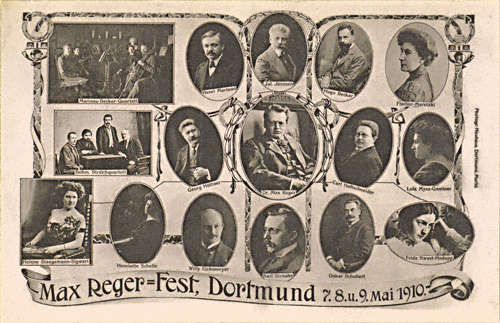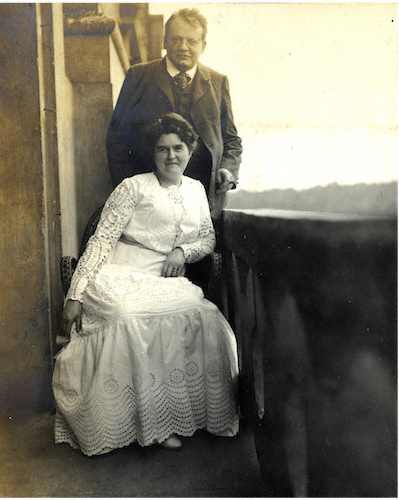1. Leipzig


In May, the first German Reger Festival is held in Dortmund, offering a representative overview of Reger's work in seven concerts. Committed Reger interpreters such as Frieda Kwast-Hodapp, Gertrud Fischer-Maretzki, Henri Marteau and Karl Straube participate free of charge or at minimal fees in this event, which is revolutionary for the musical life of the time. The celebration is to Reger's utmost satisfaction and marks a high point in his fame.
At the same time, however, it prompts various critics, including Walter Niemann from Leipzig, to take up arms against Reger’s own propaganda. Reger begins a legal dispute with Niemann, in which he wins, but ultimately loses out: Niemann becomes his fiercest opponent and forms with his Leipzig colleagues a phalanx against the composer.
On concert tours however Reger attains great success; the premiere of the Piano Quartet in D minor, Op. 113, which just like the other chamber music works written in Leipzig is not as experimental as those written in Munich but highly expressive and worked out to the last detail, is hailed at the Tonkünstlerfest of the ADMV in Zurich. The 100th Psalm, Op. 106, is also brilliantly performed in Zurich under Volkmar Andreae.
In October, Reger is awarded an honorary medical doctorate by the University of Berlin. The justification “that nothing is so suitable for uplifting and cheering up the minds of depressed and sick people as true art, and that Max Reger in particular, based on the art of the old masters, has devoted himself with rich inventiveness to the Musica sacra e profana and made it accessible to the people”1, gives rise to many glosses which rather fancy to detect traits of mental diseases in Reger’s music.
With the premiere of the Piano Concerto in F minor, Op. 114, on 15 December by the dedicatee Frieda Kwast-Hodapp under Arthur Nikisch at the Leipzig Gewandhaus, the chain of negative reactions that had begun with the Violin Concerto in A major, Op. 101, reaches its peak. Reger seeks solace in alcohol and falls into an extremely unstable state of mind, which Max Brod reports on the occasion of a Prague concert on 20 December 1910: “We sit and drink. Reger drinks particularly eagerly. At home, his wifewatches him, he tells us unabashedly; on a concert tour, he feels free. [...] From Dionysian joys he lapses into bitter sobs. His arms lie on the table, his red face streaming with tears. “My poor mother. Oh God, my mother. She's in the madhouse.” [...] The next day [...] [we] showed him Prague Castle. Now he was serious and magnificent. Never again have I had such a strong feeling that electric sparks swirling around an ingenious person crackling fantastically to the ground. [...] In the evening [...] I had the honour of leading the demigod into the concert. [...] Reger sat in his room drinking cognac, he was no longer in plain human regions. [...] Well, that will be nice in the concert tonight, I thought, heartily. And then, in the great hall, Reger played with a tenderness, a godly intimacy, a delicacy and precision that I have never heard played on the piano again in my entire life.”2
Postal items from this year whose sender or addressee is Max Reger.
Images from the Max Reger Foto Gallery that originate from this year and have a direct reference to Max Reger.
Reference
Max Reger Biography – 1910, in: Max-Reger-Portal, www.maxreger.info/biography/1910, Max Reger Biography Data, V. 3.2.0, last check: 28th December 2025.